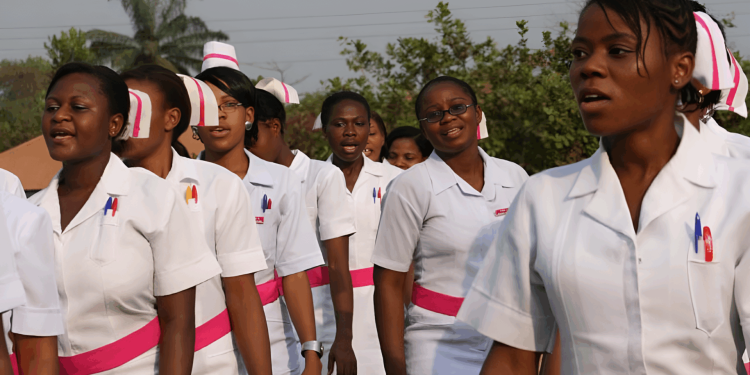Following the suspension of the recent warning strike by Nigerian nurses and midwives under the aegis of the National Association of Nigerian Nurses and Midwives (NANNM), the federal government has promised to implement some key structural reforms to improve their welfare and professional standing. The NANNM suspended their 7-day warning strike on the 4th day following negotiation with officials of the Federal Ministry of Health and Social Welfare, Trade Union Services and Industrial Relations of the Federal Ministry of Labour and Employment. In an agreement reached with the nurses and midwives, the federal government assured them that it would gazette the Nurses’ Scheme of Service, which was approved by the National Council on Establishment since 2016.
The health workers embarked on the industrial action to make the government to address their demands, which include enhanced shift allowance and upward review of uniform allowance of N300,000 per annum and payment of teaching allowance. They also want the introduction of a separate salary structure for nurses, specialist allowance, and a review of call duty allowance. Others include the payment of excess workload and burnout allowance, mass recruitment of nursing personnel and the establishment of a nursing department within the Federal Ministry of Health.
During the warning strike, medical services were significantly disrupted in government hospitals across the federation. Patients in many teaching hospitals, specialist hospitals, medical centres across the country were stranded on account of the strike. Nigeria has experienced dearth of nurses because of brain drain. As at March 2020, Nigeria had 180,709 registered nurses and 126,863 midwives. Nigeria needs not less than 800,000 additional nurses and midwives to meet its current healthcare requirements.
Unfortunately, about 75,000 nurses and midwives left the country in the last five years to countries in Europe and America. Others still working in the nation’s hospitals are waiting eagerly for the next opportunity to leave the country in search of greener pastures in United Kingdom (UK), United States (US) and Canada. The salary of an average nurse is grossly inadequate. A nurse in the country is paid between N75,000 and N201,000 per month.
The new minimum wage in the country is N70,000. The sliding value of the naira has drastically reduced the value of the new minimum wage. The increasing demand for Nigerian nurses abroad can partly explain why many prospective university students now make nursing their first choice of course. It is also why many universities are rushing to establish courses in nursing. Despite producing many nurses yearly, the nurse-to-patient ratio in Nigeria is far below the recommended global threshold.
In 2022, the World Health Organization (WHO) recommended a density of 37.7 nursing and midwifery personnel per 100,000 people. Nigeria’s nurse-to-patient ratio is 88 nurses per 100,000 Nigerians or 1:1,135, which falls short of WHO recommendation of 83:10,000 or one nurse to about 120 patients. The disparity in the ratio is more in the rural areas than urban settings. In India, the nurse/patient ratio is like 1:20 for surgical, orthopedic and dental wards, and 1:140 for medical wards. It varies from country to country.
Considering the invaluable roles played by nurses and midwives in the health sector, we call on the federal government to significantly improve their welfare. We also urge the government to honour the recent agreement it reached with the NANNM. We say this because our government has a history of reneging agreements reached with workers, be they medical doctors, university teachers and non-academic staff union of tertiary institutions. Nurses and midwives represent a significant segment of the healthcare system.
Therefore, their remuneration should be enhanced to the extent that it will deter some of them from moving abroad in search of better working conditions. We have already lost many health workers to the brain drain. Most of our best doctors, nurses and midwives now work in hospitals in Europe and America. If the government does not intentionally improve the remuneration of the health workers, especially doctors and nurses, the health system may collapse. The government should not wait for nurses to embark on strike before addressing their welfare and other matters.
Moving forward, the disruption of the healthcare system due to strike by either doctors or nurses must be avoided. Let the government fix the health sector and make our hospitals one of the best in the world and stop promoting medical tourism among the political class and affluent Nigerians. The suspended strike should serve as a wake-up call on the federal government to holistically address the challenges of the health sector, beginning with adequate funding and equipment of our hospitals.
We enjoin the state and local governments to revamp their healthcare systems and give millions of Nigerians access to quality medical services. Nigeria’s dream of achieving Universal Health Coverage (UHC) by 2030 will be a ruse if the government fails to honour the agreement reached with nurses and midwives and other health workers.
















































